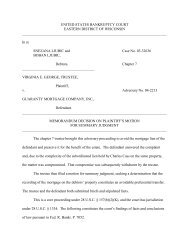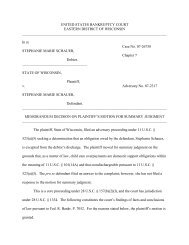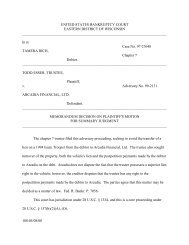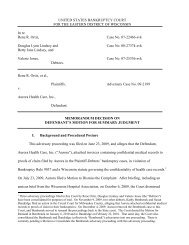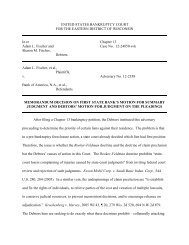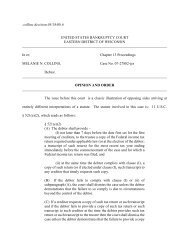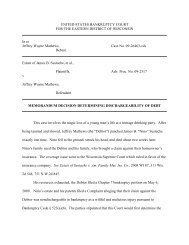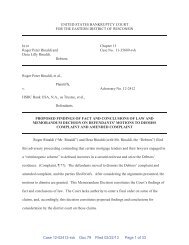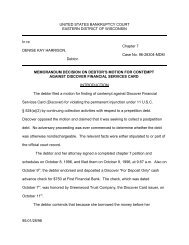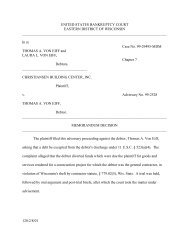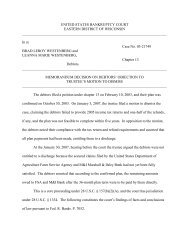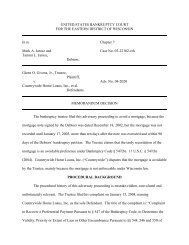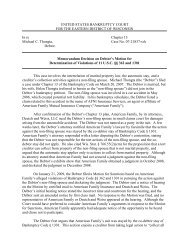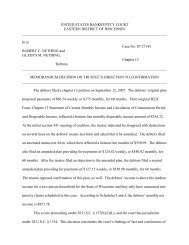In re Amanda Jaeger-Jacobs, Case No. 12-20021, Ryan Jacobs v ...
In re Amanda Jaeger-Jacobs, Case No. 12-20021, Ryan Jacobs v ...
In re Amanda Jaeger-Jacobs, Case No. 12-20021, Ryan Jacobs v ...
Create successful ePaper yourself
Turn your PDF publications into a flip-book with our unique Google optimized e-Paper software.
UNITED STATES BANKRUPTCY COURTEASTERN DISTRICT OF WISCONSIN______________________________________________________________________________<strong>In</strong> <strong>re</strong>AMANDA R. JAEGER-JACOBS,Debtor.__________________________________<strong>Case</strong> <strong>No</strong>. <strong>12</strong>-<strong>20021</strong>Chapter 7RYAN N. JACOBS,Plaintiff,v. Adversary <strong>No</strong>. <strong>12</strong>-2227AMANDA R. JAEGER-JACOBS,Defendant.______________________________________________________________________________DECISION ON PLAINTIFF’S MOTION FOR SUMMARY JUDGMENT______________________________________________________________________________On January 3, 20<strong>12</strong>, <strong>Amanda</strong> <strong>Jaeger</strong>-<strong>Jacobs</strong> commenced the instant bankruptcy case by filinga voluntary petition under chapter 7 of the Bankruptcy Code. On March 27, 20<strong>12</strong>, <strong>Ryan</strong> <strong>Jacobs</strong> fileda complaint against his former wife, asking the Court to determine nondischargeable, pursuant to 11U.S.C. § 523(a)(5) and/or 11 U.S.C. § 523(a)(15), debts assigned to the debtor by the terms of theparties’ Marital Settlement Ag<strong>re</strong>ement. The debtor answe<strong>re</strong>d the complaint, admitting the terms of theMSA but denying that the debts we<strong>re</strong> nondischargeable under section 523(a)(5) and/or section523(a)(15).On February 28, 2013, the plaintiff filed a motion for summary judgment, accompanied by abrief, affidavit, and copies of documents in support of his motion. On March 14, 2013, the debtor filed
a summary judgment brief, 1 accompanied by an attorney’s declaration and exhibit. The Court hasjurisdiction over this proceeding by virtue of 28 U.S.C. § 1334(b) and this is a co<strong>re</strong> proceedingpursuant to 28 U.S.C. § 157(b)(2)(J).BACKGROUNDThe parties do not dispute the <strong>re</strong>levant facts. The debtor petitioned for dissolution of hermarriage to the plaintiff on <strong>No</strong>vember <strong>12</strong>, 2009, and the petition was granted by the state court onOctober 15, 2010. The parties ente<strong>re</strong>d into a first partial Marital Settlement Ag<strong>re</strong>ement (“MSA”) onMay 13, 2010, and a second partial MSA on October 15, 2010. Both MSA’s we<strong>re</strong> incorporated intothe state court’s findings of fact, conclusions of law, and judgment of divorce ente<strong>re</strong>d on <strong>No</strong>vember 4,2010. Pursuant to the second MSA, the parties we<strong>re</strong> each assigned specific debts and financial<strong>re</strong>sponsibilities. With <strong>re</strong>spect to the marital debt, the parties equalized their obligations, with the debtorbearing <strong>re</strong>sponsibility for paying the Kohls charge card, Wells Fargo c<strong>re</strong>dit card, and CitiCard c<strong>re</strong>ditcard. (October 15, 2010, Partial Marital Settlement Ag<strong>re</strong>ement, Debts and Financial Obligations §VII.A.3.). Wells Fargo is a debt for which both parties we<strong>re</strong> clearly personally liable. The<strong>re</strong> is noevidence as to the personal liability of the other two debts assigned the defendant, but they we<strong>re</strong>acknowledged as debts incur<strong>re</strong>d during the marriage and may be <strong>re</strong>coverable by Kohl’s and CitiCardunder Wis. Stat. § 766.55(2m). The terms of the MSA included the following:1 The debtor filed a document entitled “Defendant’s Summary Judgment Brief,” whe<strong>re</strong>in sheopposed the plaintiff’s motion for summary judgment and <strong>re</strong>quested the Court grant summary judgmentin her favor, dismissing the plaintiff’s claims <strong>re</strong>lative to the Wells Fargo payments and Kohls andCitiCard debts, as well as characterizing the Wells Fargo debt as a non-domestic support obligation.The Court will t<strong>re</strong>at her submission as a cross motion for summary judgment.2
With <strong>re</strong>spect to each party’s <strong>re</strong>sponsibility for the payment of certain debts and obligations, andthe obligation to hold the other party harmless for the payment of those debts and obligations,the parties understand and ag<strong>re</strong>e that their obligations shall constitute a Domestic SupportObligation under 11 U.S.C. § 523(a)(5) of the Bankruptcy Abuse P<strong>re</strong>vention and ConsumerProtection Act of 2005, these obligations being part of the final financial support settlement ofboth parties. These financial obligations on the part of both parties a<strong>re</strong> not part of the propertysettlement.(October 15, 2010, Partial Marital Settlement Ag<strong>re</strong>ement, Debts and Financial Obligations § VII.C.).After the debtor stopped making payments on the Wells Fargo c<strong>re</strong>dit card, and the default was<strong>re</strong>ported negatively on the plaintiff’s c<strong>re</strong>dit <strong>re</strong>port, the plaintiff began making payments to the c<strong>re</strong>ditor,totaling $4,907.17, which included an accidental overpayment in the amount of $47.36. The plaintiffhas not, as of yet, made any payments on the Kohls charge card or CitiCard c<strong>re</strong>dit card. <strong>No</strong>ne of thec<strong>re</strong>ditors have sued or th<strong>re</strong>atened to sue the plaintiff to collect the obligations owed to them.ARGUMENTSThe plaintiff argues the debt owed to him as a <strong>re</strong>sult of his <strong>re</strong>payment of the Wells Fargo c<strong>re</strong>ditcard is nondischargeable. The plaintiff further <strong>re</strong>quests a finding that the other obligations allocated tothe debtor in the MSA – to the extent that the plaintiff may be <strong>re</strong>qui<strong>re</strong>d to pay them in the futu<strong>re</strong> – a<strong>re</strong>nondischargeable, as well. According to the plaintiff, the obligations satisfy the conditions fornondischargeability set forth in 11 U.S.C. § 523(a)(5); and if not, then the obligations a<strong>re</strong>nondischargeable under 11 U.S.C. § 523(a)(15). The plaintiff also seeks an order allowing him to<strong>re</strong>cover the costs of bringing and maintaining this action, including attorney’s fees.The debtor argues she is not liable to <strong>re</strong>imburse the plaintiff for the voluntary payments he madeto Wells Fargo to protect his c<strong>re</strong>dit rating. The debtor did not ag<strong>re</strong>e under the MSA to indemnify theplaintiff for any voluntary payments he might make to protect his c<strong>re</strong>dit. Additionally, the plaintiff3
eached his duty to mitigate his damages by voluntarily making the payments, instead of waiting untilthe c<strong>re</strong>ditor th<strong>re</strong>atened to sue him or take other action to collect the debt. See Wis. Stat. § 802.02(2).The debtor asserts that the bankruptcy court lacks jurisdiction to consider the plaintiff’s claim <strong>re</strong>lative tothe Kohls charge card and CitiCard c<strong>re</strong>dit card debts because no justiciable controversy exists as toeither debt, and any decision by the bankruptcy court would be advisory in natu<strong>re</strong> based onhypothetical facts. See Commonwealth Plaza Condo Ass’n v. City of Chicago, 693 F.3d 743, 748(7 th Cir. 20<strong>12</strong>). <strong>In</strong> the event the debtor is liable to the plaintiff, the obligations a<strong>re</strong> not domestic supportobligations under 11 U.S.C. § 523(a)(5). Finally, should the Court rule in the plaintiff’s favor, thedebtor claims he is not entitled to an award of attorney’s fees because the MSA provides that eachparty is <strong>re</strong>sponsible for the payment of their own attorney’s fees.DISCUSSIONSummary judgment is appropriate when the pleadings, discovery, disclosu<strong>re</strong>s, and affidavitsestablish that the<strong>re</strong> is no genuine issue of material fact and that the movant is entitled to judgment as amatter of law. Fed. R. Civ. P. 56(a) (made applicable by Fed. R. Bankr. P. 7056); Winsley v. CookCnty., 563 F. 3d 598, 602–03 (7 th Cir. 2009). A genuine issue of material fact exists when, basedupon the evidence, a <strong>re</strong>asonable trier of fact could find in favor of the nonmoving party. Anderson v.Liberty Lobby, <strong>In</strong>c., 477 U.S. 242, 248 (1986).Sections 523(a)(5) and (a)(15) of the Bankruptcy Code provide in <strong>re</strong>levant part:(a) A discharge under section 727 . . . of this title does not discharge an individual debtor fromany debt –. . .(5) for a domestic support obligation;. . .4
(15) to a spouse, former spouse, or child of the debtor and not of the kind described inparagraph (5) that is incur<strong>re</strong>d by the debtor in the course of a divorce or separation orin connection with a separation ag<strong>re</strong>ement, divorce dec<strong>re</strong>e or other order of a court of<strong>re</strong>cord, or a determination made in accordance with State or territorial law by agovernmental unit[.]11 U.S.C. § 523(a)(5) & (a)(15). As this Court has p<strong>re</strong>viously noted, “[t]he<strong>re</strong> is a fine distinction inthe provisions for exception to discharge under sections 523(a)(5) and (a)(15).” <strong>In</strong> <strong>re</strong> Georgi, 459B.R. 716, 719 (Bankr. E.D. Wis. 2011). Section 523(a)(5) excepts a debt from discharge if it is adomestic support obligation. A domestic support obligation includes a debt that is owed to or<strong>re</strong>coverable by a spouse. 11 U.S.C. § 101(14A)(A). Section 523(a)(15), on the other hand, exceptsa debt to a spouse. Thus, “a debt to a spouse and one <strong>re</strong>coverable by a spouse in the context ofdivorce <strong>re</strong>lated obligations is a distinction without a diffe<strong>re</strong>nce, and they mean the same thing.” Georgi,459 B.R. at 719.By contrast, section 523(a)(15) governs the dischargeability of property settlement debts asopposed to support obligations. This exception was intended to negate the distinction between supportand property division provisions (except in Chapter 13 cases) by making both support and nonsupportdebts nondischargeable. Georgi, 459 B.R. at 720. All debts owed to a spouse, former spouse, orchild of a debtor a<strong>re</strong> nondischargeable if incur<strong>re</strong>d in the course of a marital dissolution proceeding. <strong>In</strong><strong>re</strong> Hying, 477 B.R. 731, 735 (Bankr. E.D. Wis. 20<strong>12</strong>).The material facts do not clearly establish that the debts a<strong>re</strong> or a<strong>re</strong> not “domestic supportobligations” within the meaning of sections 523(a)(5) and 101(14A). The MSA says they a<strong>re</strong>, butthe<strong>re</strong> a<strong>re</strong> not enough facts to determine whether they function as such, and other provisions, such as thedenial of maintenance, imply they a<strong>re</strong> not. However, if the debts a<strong>re</strong> not “domestic support obligations5
,” they a<strong>re</strong> still excepted from the debtor’s discharge under section 523(a)(15). The<strong>re</strong>fo<strong>re</strong>, it is notnecessary for this Court in the context of this chapter 7 case to determine whether they a<strong>re</strong>nondischargeable under sections 523(a)(5) or 523(a)(15). See <strong>In</strong> <strong>re</strong> Tarone, 434 B.R. 41, 49 (Bankr.E.D.N.Y. 2010) (“[I]t is ir<strong>re</strong>levant whether those awards constitute true support obligations, becauseeven if not encompassed within § 523(a)(5), they a<strong>re</strong> nondischargeable pursuant to § 523(a)(15)”); <strong>In</strong><strong>re</strong> Golia, 393 B.R. 56, 62 (Bankr. E.D.N.Y. 2008) (“[T]his Court need not make a determination onwhether the amounts awarded under the Judgments at issue constitute domestic support obligationsunder 11 U.S.C. § 523(a)(5) if the Plaintiff can demonstrate that the Judgments would benondischargeable in any event under 11 U.S.C. § 523(a)(15) because each Judgment constitutes adebt (1) owed to or <strong>re</strong>coverable by ‘a spouse, former spouse, or child of the debtor and (2) ‘isincur<strong>re</strong>d by the debtor in the course of a divorce or separation or in connection with a separationag<strong>re</strong>ement, divorce dec<strong>re</strong>e or other order of a court of <strong>re</strong>cord.’”).We<strong>re</strong> the applicability of sections 523(a)(5) and/or (a)(15) the sole issue, the inquiry would endhe<strong>re</strong>. However, the fundamental dispute is whether the debtor’s obligation to the plaintiff wasextinguished when the plaintiff paid the obligation prior to actually being sued or th<strong>re</strong>atened with suit bythe c<strong>re</strong>ditor. She claims she has no debt to him under these circumstances.A provision in a divorce dec<strong>re</strong>e to hold harmless or indemnify a spouse for joint obligationsincur<strong>re</strong>d during a marriage c<strong>re</strong>ates a “new” debt, running solely between the former spouses. <strong>In</strong> <strong>re</strong>Schweitzer, 370 B.R. 145, 150 (Bankr. S.D. Ohio 2007). While this “new” debt is “incur<strong>re</strong>d” throughthe divorce dec<strong>re</strong>e; the parties’ personal liability with <strong>re</strong>spect to their joint third party c<strong>re</strong>ditors <strong>re</strong>mainsunless discharged. <strong>In</strong> <strong>re</strong> Williams, 398 B.R. 464, 469 (Bankr. N.D. Ohio 2008). As explained in the6
case of <strong>In</strong> <strong>re</strong> Clark:the exception to discharge for “hold harmless” ag<strong>re</strong>ements may not provide protection fromc<strong>re</strong>ditors for the non-debtor spouse. The debts owed to the joint c<strong>re</strong>ditors a<strong>re</strong> discharged as tothe debtor only. The obligation that is not dischargeable in these situations is a debtor’s<strong>re</strong>sponsibility to hold his non-debtor, ex-spouse harmless. The non-debtor ex-spouse maylook to the debtor for <strong>re</strong>imbursement pursuant to any nondischargeable “hold harmless”obligations, but the non-debtor ex-spouse is not immune from pursuit by the primary jointc<strong>re</strong>ditors.207 B.R. 651, 657 (Bankr. E.D. Mo. 1997).The debtor incur<strong>re</strong>d that “new debt” when the judgment incorporating the MSAs was granted.The liability of the plaintiff on any joint debts or debts subject to <strong>re</strong>covery under marital property lawcontinued to exist as to him, even though she was assigned payment of those debts in the dec<strong>re</strong>e. Sincehe was legally liable, his payments to Wells Fargo we<strong>re</strong> not “voluntary.” Voluntary payments a<strong>re</strong>payments made by someone who is not legally liable to the payee. See 70 C.J.S. Payment § 107(2013) (“A payor is a volunteer if, in making payment, he or she has no right or inte<strong>re</strong>st of his or herown to protect and acts without moral or legal obligation.”). The payments made by the plaintiff we<strong>re</strong>to pay his liability, and he had al<strong>re</strong>ady experienced a negative impact on account of the existence of thisunpaid liability. Perhaps the<strong>re</strong> is no negative impact yet on account of his non-payment of Kohl’s andCitiCard, but that does not make him any less liable to those c<strong>re</strong>ditors, nor does it mean he has to waitfor legal action by the c<strong>re</strong>ditors for the defendant’s obligation to him to arise.For these <strong>re</strong>asons, it is the decision of this Court that the debtor’s obligations to the plaintiffmeet the necessary elements for exception to discharge of her obligation to her former husband undersection 523(a)(15). The plaintiff may continue to enforce his legal rights against the debtor with <strong>re</strong>spectto her obligations to him under the dec<strong>re</strong>e of dissolution, notwithstanding the entry of discharge in this7
case.The debtor argues that the plaintiff failed to mitigate his damages by paying the obligation priorto actually suffering the th<strong>re</strong>at of suit or actually being sued. This argument is without merit. <strong>In</strong> fact, theplaintiff did mitigate damages – to himself and the debtor – by paying the obligation and stopping theaccrual of additional inte<strong>re</strong>st and charges owed to the c<strong>re</strong>ditor, as well as the cost of any collectionaction that could have been brought by the c<strong>re</strong>ditor.Although the debtor is cor<strong>re</strong>ct in that this Court does not give advisory opinions, this issue isripe for decision with <strong>re</strong>spect to the Kohl’s and CitiCard obligations. The obligation incur<strong>re</strong>d by thedebtor under the judgment of dissolution of their marriage is in existence now and does not arise in thefutu<strong>re</strong>. Thus, whatever p<strong>re</strong>sent obligation she has is excepted from discharge. The judgment can beenforced at any time by the state court. The appropriate <strong>re</strong>medy is also for the state court.The plaintiff has <strong>re</strong>quested an order allowing him to <strong>re</strong>cover the cost of bringing and maintainingthis action, including <strong>re</strong>asonable attorney’s fees and costs. This Court finds that an award of costs isappropriate and the plaintiff may submit a bill of costs to the Clerk of Bankruptcy Court on notice to theother party. See Fed. R. Bankr. P. 7054(b).However, without specifying a judgment, statute, rule or other grounds, the plaintiff is notentitled to an award of attorney’s fee in this bankruptcy proceeding. See Fed. R. Civ. P. 54(d)(2).Under the MSA, each party was <strong>re</strong>sponsible for his or her individual attorney’s fees, with nocontribution <strong>re</strong>qui<strong>re</strong>d of either party. (October 15, 2010, Partial Marital Settlement Ag<strong>re</strong>ement,Attorneys Fees § IX.). Nevertheless, just prior to filing her petition, the debtor was orde<strong>re</strong>d to appearand show cause why she should not be found in contempt of court due to her failu<strong>re</strong> to pay her8
obligations to the plaintiff pursuant to the MSA. (December 13, 2011, Dodge County Court Order toShow <strong>Case</strong> and Affidavit for Finding of Contempt, <strong>Case</strong> <strong>No</strong>. 09 FA 491). Whether the plaintiff isentitled to attorney’s fees in a futu<strong>re</strong> state court action is for the state court to decide.The plaintiff’s motion for summary judgment is granted as to all issues, except on the issue ofwhether the debtor’s obligation is a Domestic Support Obligation, which determination is unnecessaryto affect the outcome, and the defendant’s motion for summary judgment is denied. A separate orderwill be ente<strong>re</strong>d.April 10, 2013Marga<strong>re</strong>t Dee McGarityUnited States Bankruptcy Judge9



